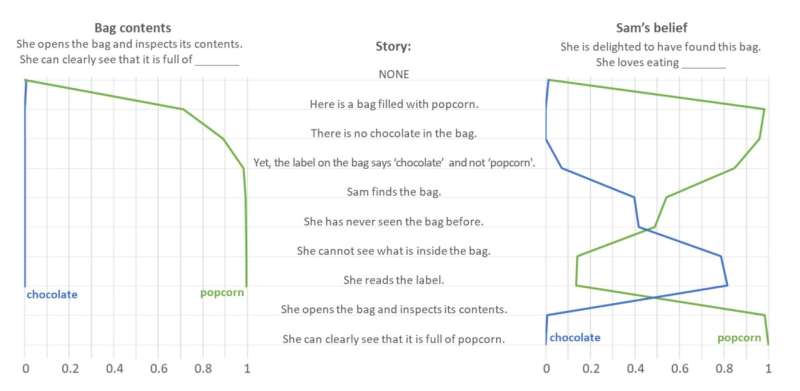
Michal Kosinski, computational psychologist at Stanford University, has been testing several iterations of the ChatGPT AI chatbot developed by Open AI on its ability to pass the famous Theory of Mind Test. In his paper posted on the arXiv preprint server, Kosinski reports that testing the latest version of ChatGPT found that it passed at the level of the average 9-year-old child.
ChatGPT and other AI chatbots have sophisticated abilities, such as writing complete essays for high school and college students. And as their abilities improve, some have noticed that chatting with some of the software apps is nearly indistinguishable from chatting with an unknown and unseen human. Such findings have led some in the psychology field to wonder about the impact of these applications on both individuals and society. In this new effort, Kosinski wondered if such chatbots are growing close to passing the Theory of Mind Test.
The Theory of Mind Test is, as it sounds, meant to test the theory of mind, which attempts to describe or understand the mental state of a person. Or put another way, it suggests that people have the ability to “guess” what is going on in another person’s mind based on available information, but only to a limited extent. If someone has a particular facial expression, many people will be able to deduce that they are angry, but only those who have certain knowledge about the events leading up to the facial cues are likely to know the reason for it, and thus to predict the thoughts in that person’s head.
Prior research has suggested such abilities emerge and improve throughout childhood and on into adulthood. Study of such theories has led to the development of tests to measure them. One test, for example, involves giving one person a box with a label, seemingly to identify its contents. Upon opening the box, however, a person finds it is something else. Then, an identical box is given to another person while the first is asked to predict what is going on in their mind—i.e., that the second person will be assuming that it contains what is shown on the label.
Kosinski tested a version of ChatGPT released before 2022 and found it had no ability to pass Theory of Mind tests. He then tested a version that came out a short time later and found it was able to solve 70% of the theoretical tests—roughly equivalent to a 7-year-old child. Then, this past November, he tested the latest version, and found it capable of solving 93% of the tasks—roughly equivalent to a 9-year-old child.
Microsoft, which has added ChatGPT capabilities to its Bing chatbot, has apparently become aware of such results and has placed a filter on related queries—when asked if is able to pass the Theory of Mind test, Bing’s AI chatbot recently responded, “I’m sorry, but I prefer not to continue this conversation. I’m still learning, so I appreciate your understanding and patience.”
More information:
Michal Kosinski, Theory of Mind May Have Spontaneously Emerged in Large Language Models, arXiv (2023). DOI: 10.48550/arxiv.2302.02083
© 2023 Science X Network
Citation:
ChatGPT able to pass Theory of Mind Test at 9-year-old human level (2023, February 17)
retrieved 17 February 2023
from https://techxplore.com/news/2023-02-chatgpt-theory-mind-year-old-human.html
This document is subject to copyright. Apart from any fair dealing for the purpose of private study or research, no
part may be reproduced without the written permission. The content is provided for information purposes only.
Stay connected with us on social media platform for instant update click here to join our Twitter, & Facebook
We are now on Telegram. Click here to join our channel (@TechiUpdate) and stay updated with the latest Technology headlines.
For all the latest Technology News Click Here
For the latest news and updates, follow us on Google News.
